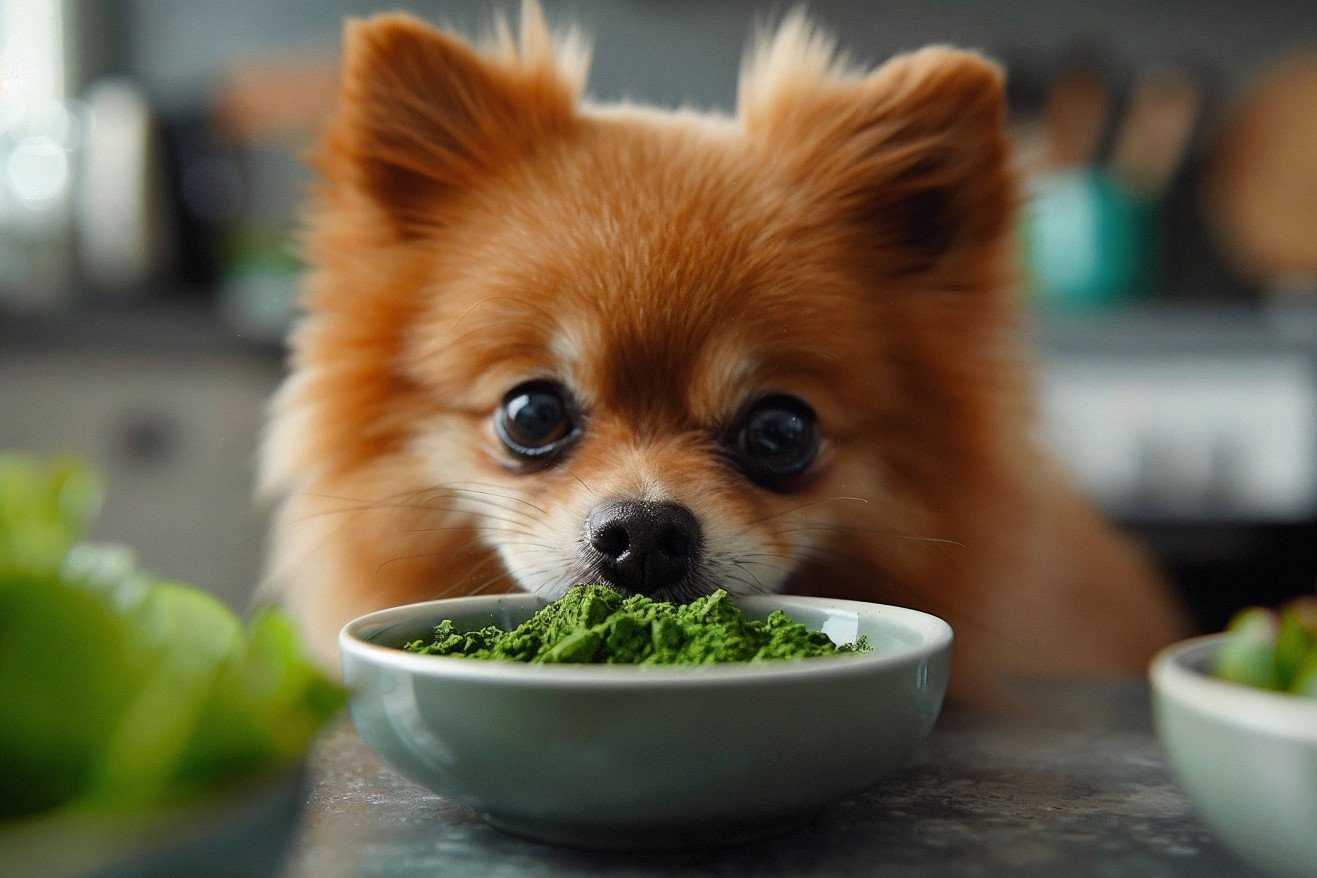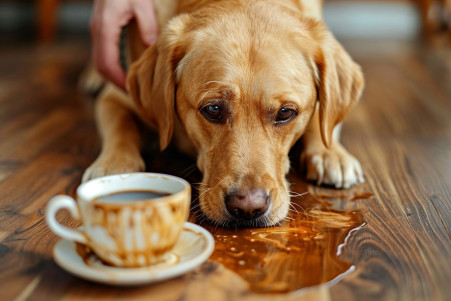Is Matcha Safe for Dogs? What the Science Says
13 May 2024 • Updated 13 May 2024

Whether you're thinking about adding a superfood to your dog's diet or you're curious if you can share your love of matcha with your furry friend, it's important to ask the question: Can dogs have matcha? Dogs can have matcha green tea in moderation as it contains antioxidants that may benefit their health. However, the caffeine in matcha could potentially cause issues like restlessness, increased heart rate and insomnia if consumed in large amounts, so moderation is key.
This article will cover the scientific studies conducted by veterinary nutritionists and other animal professionals that have looked into the potential benefits and risks of giving dogs matcha. These studies have looked at the components of matcha green tea and can help determine the right amount to give dogs and any potential side effects. We'll also cover other ways to give your dog the benefits of this superfood without the risks.
Is matcha safe for dogs?
Signs and Treatment of Caffeine Poisoning in Dogs
Caffeine poisoning in dogs can lead to a variety of symptoms, which can start to show up within 30 minutes to 2 hours of ingestion, according to VCA Animal Hospitals. Early symptoms can include restlessness, irritability, hyperactivity, vomiting, and panting. However, at higher doses, symptoms can become more serious and include tremors, seizures, tachycardia (an abnormally fast heart rate), arrhythmias, and even collapse.
There is no specific antidote for caffeine poisoning in dogs. According to Wag Walking, treatment will focus on decontamination, which can include inducing vomiting and administering activated charcoal to reduce absorption. Supportive care will also be necessary, and this may include the use of medications to help control seizures, manage heart rate and blood pressure, and address other symptoms.
It's important to get your dog to the vet as soon as possible, as the Pet Poison Helpline explains, caffeine poisoning in dogs can be fatal if it's not treated. If treatment is sought early, the prognosis for mild cases is generally good, but severe cases can still be life-threatening. It's important to know the signs and seek treatment as soon as possible if you suspect your dog has ingested caffeine.
How Much Matcha Can You Give a Dog and Are There Any Risks?
Veterinary professionals do not recommend giving dogs matcha due to the high risk of caffeine toxicity, according to Ooika. Even small amounts of matcha can lead to symptoms of caffeine toxicity in dogs, including restlessness, vomiting, and seizures, which can occur within 2 hours of consumption according to Ooika.
The lethal dose of caffeine for dogs is between 110 and 200 mg/kg of body weight, with an average of 140 mg/kg, according to a study published on the National Institutes of Health. Because one gram of matcha powder contains approximately 25 mg of caffeine, it can be toxic for dogs.
Unfortunately, there is no known safe dose of matcha for dogs, as the sensitivity to caffeine can vary widely from one individual to another. PetMD notes that doses of caffeine as low as 14 mg per pound of body weight can cause restlessness and agitation in dogs. As a result, it’s best to avoid giving dogs matcha and instead look for other options that don’t contain caffeine but can still offer similar health benefits.
Safer Antioxidant-Rich Alternatives for Dogs
Although matcha is not safe for dogs, there are other alternatives that can provide the same antioxidant benefits without the caffeine. Dogs Naturally Magazine explains that decaffeinated green tea that is brewed properly and given in moderation can be a good source of antioxidants for dogs. The article explains that green tea contains antioxidant polyphenols known as catechins, which have anti-inflammatory, immune-boosting, and brain-protective properties.
Herbal teas like chamomile, ginger, and rooibos are also caffeine-free options that can provide anti-inflammatory and digestive benefits, according to Felcana. The Dog Bakery blog explains that while green tea can be beneficial for dogs, it's best to consult a vet before giving it to your dog or adding any new supplements to their diet.
There are also antioxidant supplements that are made specifically for dogs, which can provide a more concentrated source of beneficial compounds without the caffeine. However, it's always best to consult a vet before making any major changes to your dog's diet or adding new supplements.
How to Introduce New Foods and Supplements to a Dog's Diet
To prevent digestive problems, it's important to introduce new foods, treats, or supplements to a dog's diet slowly, as ZamiPet explains. This means adding small amounts of the new item to the dog's regular food and then gradually increasing the amount over a period of days. According to PetMD, this is especially important for puppies and dogs with certain health conditions.
Keep a close eye on the dog for any signs of negative reactions, like vomiting or diarrhea, and adjust the amount of the new food or supplement as needed. Moe's Healthy Pets suggests sticking to the same amount and looking for any digestive or other issues. Take the dog's age, size, and any health issues into account when determining the right amount to give them.
Make sure to talk to a vet, especially if your dog has special dietary needs or health issues, before making any major changes to their diet. According to TRATEZ, it's especially important to talk to a vet before giving your dog a new supplement to make sure it's safe and effective.
Antioxidant Supplements and Herbal Teas for Dogs
Dogs can benefit from antioxidant supplements that are specifically designed for their needs, which can offer concentrated amounts of superfruits such as blueberries, raspberries, and pomegranate, as called out in Cranimals' antioxidant supplement. In addition, supplements that include green tea extract, beta-glucans, and fish protein can help with immune support and cellular repair, like CORE IMMUNE CARE by Pet Wellbeing.
Herbal teas that include alfalfa, hawthorn, nettle, and dandelion can help with overall wellness and hydration for dogs, as seen in The Boulder Tea Company's Healthy Hound tea. Meanwhile, adaptogenic herbs such as ginkgo, astragalus, and eleuthero root can provide even more advantages when they are added to supplements or teas, like in the case of the Healthy Hound tea.
When looking for antioxidant supplements or herbal teas for dogs, make sure to look for products from reputable companies and adhere to the recommended dosages based on your dog's age and weight, per Only Natural Pet's Whole Food Antioxidant Blend.
Conclusion: Putting Your Dog's Safety and Well-being First
Matcha is a type of green tea that is ground into a fine powder, and it contains a high amount of caffeine, which can be toxic to dogs in large amounts. Modern Vet explains that even small amounts of matcha can cause negative reactions in dogs, including restlessness, tachycardia, vomiting, and insomnia. The lethal dose of caffeine for dogs is 110 to 200 mg/kg of body weight, with an average of 140 mg/kg. Since one gram of matcha powder contains approximately 25 mg of caffeine, it can be toxic to dogs.
Because of the high risk of caffeine toxicity, veterinarians do not recommend giving matcha to dogs. Ooika notes that there is no established safe dose range for matcha in dogs, as individual sensitivity to caffeine can vary widely. In fact, even small doses of caffeine, such as 14 mg per pound of body weight, can cause restlessness and agitation in dogs, according to PetMD.
Although matcha may have health benefits for humans, its caffeine content makes it unsafe and potentially toxic for dogs. Instead, there are other options, such as decaffeinated herbal teas and antioxidant supplements, that can provide the same health benefits without the risks associated with caffeine. However, it's important to consult with a veterinarian and follow a slow transition when adding any new supplements to a dog's diet.


